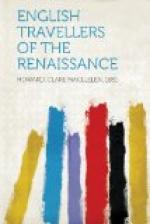The whole of the Precepts is marked by this extensive caution. Since, as Moryson truly remarks, travellers meet with more dangers than pleasures, it is better to travel alone than with a friend. “In places of danger, for difference of Religion or proclaimed warre, whosoever hath his Country-man or friend for his companion doth much increase his danger, as well for the confession of his companion, if they chance to be apprehended, as for other accidents, since he shall be accomptable and drawne into danger, as well as by his companion’s words or deeds, as by his owne. And surely there happening many dangers and crosses by the way, many are of such intemperate affections, as they not only diminish the comfort they should have from this consort, but even as Dogs, hurt by a stone, bite him that is next, not him that cast the stone, so they may perhaps out of these crosses grow to bitterness of words betweene themselves."[192] Instead of a companion, therefore, let the traveller have a good book under his pillow, to beguile the irksome solitude of Inns—“alwaies bewaring that it treat not of the Commonwealth, the Religion thereof, or any Subject that may be dangerous to him."[193] Chance companions of the road should not be trusted. Lest the traveller should become too well known to them, let him always declare that he is going no further than the next city. Arrived there, he may give them the slip and start with fresh consorts.
Moryson himself, when forced to travel in company, chose Germans, kindly honest gentlemen, of his own religion. He could speak German well enough to pass as one of them, but in fear lest even a syllable might betray his nationality to the sharp spies at the city gates, he made an agreement with his companions that when he was forced to answer questions they should interrupt him as soon as possible, and take the words out of his mouth, as though in rudeness. If he were discovered they were to say they knew him not, and flee away.[194]
Moryson advised the traveller to see Rome and Naples first, because those cities were the most dangerous. Men who stay in Padua some months, and afterwards try Rome, may be sure that the Jesuits and priests there are informed, not only of their coming, but of their condition and appearance by spies in Padua. It were advisable to change one’s dwelling-place often, so to avoid the inquiries of priests. At Easter, in Rome, Moryson found the fullest scope for his genius. A few days before Easter a priest came to his lodgings and took the inmates’ names in writing, to the end that they might receive the Sacrament with the host’s family. Moryson went from Rome on the Tuesday before Easter, came to Siena on Good Friday, and upon Easter eve “(pretending great business)” darted to Florence for the day. On Monday morning he dodged to Pisa, and on the folowing, back to Siena. “Thus by often changing places I avoyded the Priests inquiring after mee, which is most dangerous about Easter time, when all men receive the Sacrament."[195]




